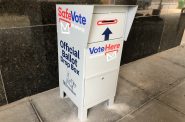Does Wisconsin Have Republicans With Integrity?
For instance, how about the four candidates for governor?
Hearings of the U.S. House committee to investigate the January 6th insurrection at the Capitol have been accompanied by a steady stream of accusations that they are an effort by House Democrats to gain a partisan advantage. A number of heroes have emerged from the hearings, people who took their oath to the Constitution seriously and refused to overturn the election.
These included Rusty Bowers, Speaker of the Arizona House of Representatives; Brad Raffensperger, the Georgia Secretary of State; and Jeffrey Rosen, Acting U.S. Attorney General. Even former Vice President Mike Pence, who spent four years looking worshipfully at Donald Trump, gained new respect for refusing to participate in efforts to steal the election.
An opinion piece in the Washington Post by E.J. Dionne asks, “how many Rusty Bowers Republicans are out there?” How many are there in Wisconsin?
Why did Trump and his supporters single out election administration in Wisconsin, as well as Michigan, Pennsylvania, Georgia, Arizona, and Nevada for attack following his loss in the 2020 election? The answer is not that there was something glaringly wrong about these states’ election management. Instead, the answer lies in the closeness of the vote in these four states.
The chart below compares the Democratic vote by state in 2016 (Hillary Clinton), on the horizontal axis, with the Biden vote in 2020, on the vertical axis. The percentages are the share of the vote for one of the two major parties, which leaves out votes for third parties and write-ins. Thus, while the chart shows the Democratic share, the Republican share can be calculated by subtracting the Democratic share from 100%. Also, any vote share over 50% is a winning vote.
This chart also shows why Trump and his supporters chose to attack the elections in Wisconsin and the five other competitive states, shown with purple dots. All are very close to the 50% line in both years. All but Nevada were won by Trump in 2016. In 2020, all six were won by Biden, which flipped the Electoral College.
Two other things on the chart are worth noting. The trend line, shown with red dots, is well above the diagonal line shown in yellow, reflecting the increase in 2020 voting for Biden. Also, most of the states are above the diagonal reflecting the fact that Biden’s share of the vote increased more than Trump’s in most states.
The chart below shows Clinton’s share of the 2016 vote (in green), Joe Biden’s share in 2020 (in yellow), and Biden’s share of the increased vote in 2020 (in maroon). Except for Nevada, Biden’s share of the vote grew in 2020. As the overall pattern for the US reflects, this pattern is repeated in about 90% of the states.
Thus, following in his loss in the election, Trump chose to challenge the election in the six states because of the closeness of the vote in those states. His strategy was to first find practices in the existing election administration that could be attacked.
None of these challenges were successful. One reason was the challenges were basically unfair. It was offensive that voters who voted following the existing rules should be disenfranchised because of a change in rules. (Although three of the seven justices of Wisconsin’s Supreme Court seemed fine with this argument.)
Despite Trump’s lack of success at using his attack on Wisconsin’s election practices to overturn the election, his critique seems to have taken root with the Republican candidates for governor, to judge by statements on their websites.
Of them, Timothy Ramthun is the least explicit, somewhat surprisingly because he has made decertifying the election the centerpiece of his campaign. He includes a quite generalized discussion which concludes that “Tim Ramthun courageously investigated claims of fraud and spoke the truth. He won’t stop.”
Despite having the shortest section on elections, in a single paragraph, Kevin Nicholson echoes a number of the points that Trump’s people made in trying to reverse the election outcome. Here is it in its entirety:
End ballot harvesting, and use of ballot drop boxes to restore faith in our election processes and eliminate the unaccountable Wisconsin Election Commission. Mandate the counting of all legally requested and legally returned absentee ballots at one statewide location with transparency.
The other two candidates, Tim Michels and Rebecca Kleefisch are also into banning stuff. While both claim a desire to make it easier to vote, they would ban drop boxes and “ballot harvesting,” thus making it harder to return absentee ballots. For voters with mobility issues, a ban on asking others to deliver a ballot could be a particular challenge.
Nicholson and Kleefisch would also eliminate the “unaccountable” Wisconsin Elections Commission. There is no hint as to what they would replace it with. If history is a guide, it would be something much more under the thumb of Republicans in the Legislature. The truth is that the election in Wisconsin was well run. The fact that the four candidates are so willing to lie about it suggests a lack of integrity and fitness for office.
The simple answer to the question as to whether there are Rusty Bowers-styled Republicans are out there is that there may be others in Wisconsin, but don’t look for them among the candidates for governor.
Data Wonk
-
Scott Walker’s Misleading Use of Job Data
 Apr 3rd, 2024 by Bruce Thompson
Apr 3rd, 2024 by Bruce Thompson
-
How Partisan Divide on Education Hurts State
 Mar 27th, 2024 by Bruce Thompson
Mar 27th, 2024 by Bruce Thompson
-
Will Wisconsin Supreme Court Legalize Absentee Ballot Boxes?
 Mar 20th, 2024 by Bruce Thompson
Mar 20th, 2024 by Bruce Thompson



















That was just a rhetorical question, right?
Nice partisan op Ed. Par for the course for this rag.
Well, if you include RoJo the Conspiracy Clown, Paul Ryan, Robin Vos, and Scott Fitzgerald, then no, absolutely not.
mr. belinski, a} this is NOT a rag, b} name one republican who has integrity. just one. many years ago, i could find a rrpublican, i believed had some integrity—jack kemp, mccain, anyone else??? so, maybe you need to look at the republicans in our state. name one with integrity.
Bellski – meh.
I think this question can be extended to Republican members of the legislature and the Republican Congressman. The few Republican legislators whom have raised questions about election conspiracies, Gablemen and some other bizarre policy positions of the party are retiring. All of the Republican Congressman are in lock strip with Trump.